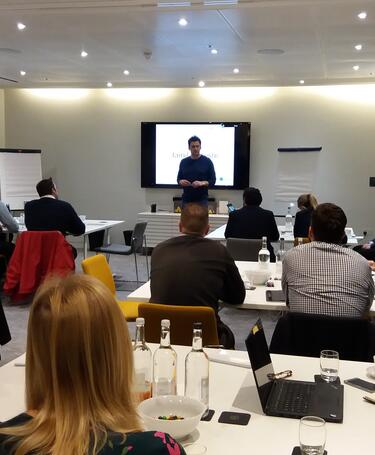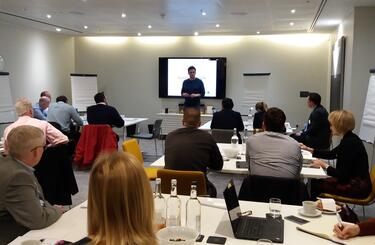
How great leadership powers success
Progress indicator

The CQI’s first corporate connect event of 2019, Driving Performance and Enabling Change: How Great Leadership Powers Success, took place on the 29 January in London, and was held in collaboration with Shirley Parsons Limited (SPL).
Driving Performance and Enabling Change: How Great Leadership Powers Success was an event exclusive for CQI corporate partners, aimed to equip leaders with skills and techniques that impact their workplace, mainly how to change behaviours by changing thinking, how to create ownership and accountability and how to seek new opportunities and new possibilities.
The main speaker for the day was Jamil Qureshi, world-class expert in driving business performance and one of today’s foremost practitioners of performance psychology and an expert in high performance. As the co-founder of several change agencies, Qureshi works with a diversity of talented business and sports people and teams around the world.
Qureshi began the event by asking attendants to think about some examples of dystopian futures and imagining how society and businesses would cope with scenarios such as a society where people sleep for 23 hours a day, or where people have to change gender when they reach 30 years old. This was the starting point to talk about change. He observed that dramatic changes don’t work as well as consistent changes: “It’s easier to change 100 things by 1% than one thing 100%.”
Success is about knowledge
Advising on how to achieve sustainable success, Qureshi said that successful organisations are ones that learn faster and better than their competitors and have a strong network. “It’s important to build communities based on knowledge. Purpose maximisation drives profit maximisation. Success never happens in isolation – we are always part of a team and it is important for us to understand our network. Companies no longer compete against companies. Networks compete against networks.” He added that companies have to look externally to see what their network looks like, and leaders have to look at the organisation’s internal networks.
After explaining the We Think, We Feel and We Act principle (a person has a system of thinking that affects how that person feels, so that person’s actions are according to the way that person thinks), Qureshi said that to change actions, you need to change how people think in your organisation – the difference between commitment and compliance. He gave the example of TOMS Shoes, a North American company that designs and sells shoes, with a difference: when they sell a pair of shoes, a new pair of shoes is given to an impoverished child elsewhere in the world. Qureshi explained that this motto makes employees think differently about their job, as they feel they are working towards something important, and that positively affects their actions. He asked attendees to think about the real value of what their role and organisation provide.
Qureshi continued the theme of success by saying that people who perform at exceptional levels are those trying to achieve something, instead of trying to avoid negative consequences, and leaders should keep this in mind when considering their team members. We should all act as if we were the best we can be, understand what we are doing well and do more of that, he suggested. This can be adapted to organisations: exploring their strengths and transferring those strengths to other departments in the organisation. He suggested using the Johari Window, a technique that helps people better understand their relationship with themselves and others, as a useful tool to understand our strengths.
According to Qureshi, a successful business is the one that is constantly adjusting, as our ability to respond to circumstances is essential to achieve the best outcome. As an example, of how attitude is more important than circumstances, he asked attendees to imagine different disruption scenarios, such as: if you only had four hours a week to perform your job, how would you organise your time?
Think, feel, act
After the event, Qureshi, who in his own words is in the business of understanding what people do and help them do it better, talked to Alicia Dimas, Content Executive at the CQI, about the importance of “different thinking” to achieve “different doing”.
Only by changing people’s perceptions and ways of thinking, can you can make sustainable changes in people’s behaviours, he stressed.
“Once we start changing the words and pictures in people’s heads, we can allow them to think differently, and therefore feel differently – and to act differently. Too many people are too busy trying to change their own actions – or their team’s actions – by working on behaviours, but the precursor to that are our thoughts. So, the difference between commitment and compliance, if you are looking into changing a behaviour, is whether you work on the thoughts or whether you work on the actions.”
Enabling change
Attending the event was Cecilia Suarez-Lledo Friera, Quality Department Manager at Fluor Corporation, a multinational engineering and construction firm, who said she found the session “interesting and enlightening”.
“I believe in emotional intelligence and that tackling team members’ feelings is how we can make things happen,” she said. One of the main learnings she was taking home from the event was the We Think, We Feel and We Act principle and how, to achieve success, you should act as if you have already achieved your goal. For instance, if you are training to win a race, you would act as you would if you were already the fastest runner in world, and consider: How would you train? Who would you talk to? How would you behave the night before a run?
The Driving Performance and Enabling Change event was held in collaboration with the recruitment company Shirley Parsons Limited (SPL). An association between SPL and the CQI is has benefited both organisations said Shirley Parsons, SPL’s chief executive. Parsons commended the event as “thought-provoking.” “Everybody participated and there was a good balance between hearing from the speaker and working on themes on the tables, she concluded.”
Quality World

Get the latest news, interviews and features on quality in our industry leading magazine.
